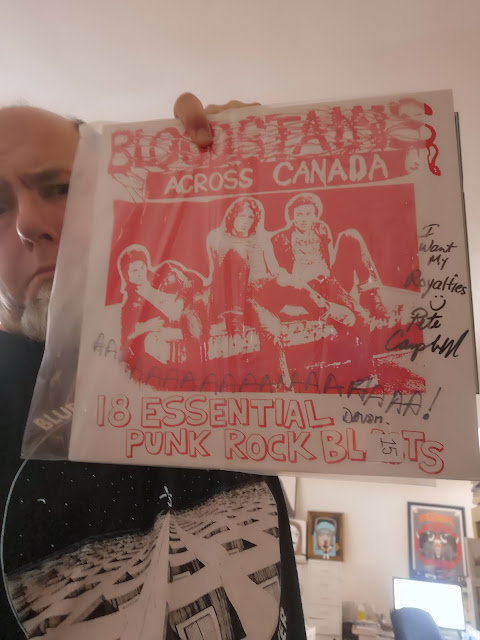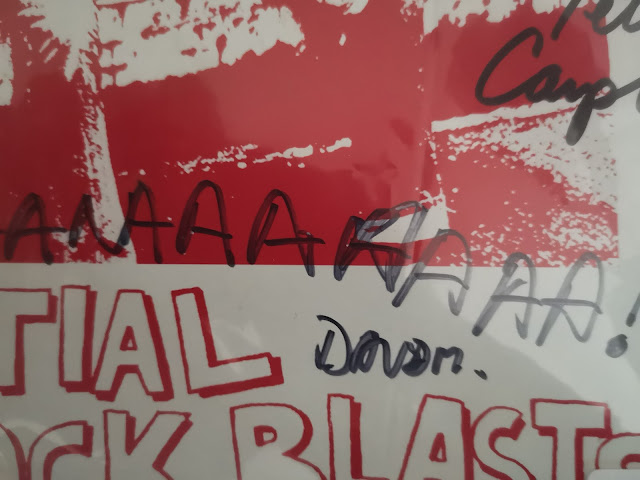Still on break for a few days, in terms of actually working on articles, but that doesn't mean I can't put one thing up for fun!
I am heretofore creating a term for a garage sale where you find cool things you actually want, at a price you can actually afford - the kind of garage sale you tell your friends on social media about, the kind of garage sale that makes up for months of garage sales that have been all baby clothes, lug wrenches, crockpots and encyclopedias. This heretofore will be known by me as a "Raymond Chandler Garage Sale," riffing on Robyn Hitchcock's use of "Raymond Chandler" as an adjective and referencing the possibility that you will soon end up reading a Raymond Chandler novel that you bought there for a dollar, as I now am.
I mean: it couldn't have come at a better time. I had just watched the 1944 Raymond Chandler film Murder, My Sweet and the 1975 film Farewell, My Lovely - both adaptations of the second of the two novels in the photo above, despite the different titles - with an eye towards comparing them. Having allowed myself a little time away from transcribing interviews and doing more "music journalism"-type blogging, I was actually casting about for a book I might read - allowing myself a bit of precious actual downtime, unlike the strangely worklike downtime of the last couple of months - so reading the Chandler had actually sprung to mind as something I might want to do, but for the book to spring to HAND as well - for a mere dollar! - well, that's something that was meant to be.
It's really interesting, by the way - really instructive. Both films contain certain key elements of the novel - a big thug named Moose Molloy, having just been released from prison, is looking for his girlfriend Velma, and hires Philip Marlowe to find her (Dick Powell in the 1944 film, looking a little bit LIKE Raymond Chandler, really, and Robert Mitchum in the 1975); Marlowe also gets enlisted in the hunt for a stolen jade necklace. Both films have these plotlines intersect, but place different weight on each and have rather different beginnings and endings.
The 1944 film takes the most liberties with Chandler. I haven't finished the book yet, but based on the 1975 film and what I've read so far, it seems to add a female character (ending on a kiss, akin to the tacked-on happy ending of Thieves' Highway) and to place more weight on the hunt for the stolen jade. It also softens what seem to be a couple of key themes in the novel (or at least themes which seem to be emerging as I enter it): that of race relations and that of police laziness. The first stop in the search for Moose's girlfriend, a nightclub called Florians (run by a big Greek-looking fella in the 1944 film) has become, in the book, an exclusively black club, and there is a conflict between Moose and the owner of the club who ends up dead at Moose's hands. This is present in the 1975 film, but it is presented less dramatically than in the book, where the tension is such that Marlowe and Malloy are initially told as they enter that they won't be served ("No white folks, brother. Jes' fo' the colored people, I'se sorry" - from page 240 of the Modern Library edition).
Now, I'm no expert in the history of American racism, but this from my present remove seems like it might be a historical inaccuracy, or perhaps even a perverse inversion of how segregation actually worked; I imagine the white clubs that refused to serve black people vastly outnumbered the black clubs that could even consider refusing to serve white people. But the book still seems defensible in its depiction of race relations, more an observer of human ugliness than an active participant; its black characters are presented matter-of-factly and sympathetically. Marlowe does use the "N-word" when talking with cops and such, but also shares a bottle with a black man he pumps for information and has no apparent judgements about him or anyone based on their skin colour, while there is clearly subtle judgement of the cops for being relatively uninterested in a crime in which a black man is killed. There's no sense of gleeful taboo-violation that you might find in Tarantino or Ellroy, in digging into what I presume was somewhat hushed-up, societally; if anything, Chandler seems a bit sad to find society thus. But like I say, there's no trace of this theme in the 1944 version, and even the 1975 film softens things a fair bit.
What both films omit, compared to the novel, is the cops' dependency on Marlowe to do their dirty work for them. Murder, My Sweet sets a trope in motion that you see in countless other detective thrillers, by which the detective is always two steps ahead of the cops, who treat the detective like a snooping busybody, interloping outsider, and possible suspect (the beginning of Murder, My Sweet begins with an interrogation scene, seen in the poster above, that I assume was the direct inspiration/ granddaddy of the interrogation scene that opens Nobody, among other films).
There are things that both films do very well, mind you. The 1944 seizes on a particular aspect of Chandler, the language, and condenses the snappy, cynical repartee and vintage street slang - like taking "a nibble" for having a drink of alcohol - until the narration and dialogue become something akin to what you see in Brick, a highly-stylized pastiche of hardboiled detective writing (yes, I realize Brick was playing with Hammett, not Chandler). It takes no interest in Chandler's world-weariness, his despair, his cynicism about humanity; it makes a glib, fast-talking entertainment out of a story that is actually fairly sad and despairing, but it DOES pack in almost every "cute" line in the novel, like the screenwriter went through the book with a highlighter for each choice phrase and used his notes to tag them to the revised plot. These lines ARE a very fun part of reading Chandler, but are spread throughout the book; so you pause for a moment in amusement ("Ha, ha, my bank account was 'trying to crawl under a duck,' now that's a way to put it... I been there...") and then read several pages before you get to the next. Murder, My Sweet boils away the beet to make sugar, so to speak - or choose your metaphor of distillation, but it has more in common with cocaine, whiskey, and sugar than it does with Chandler's downbeat, exhausted, and slightly pissed-off prose, even though it was originally taken from Chandler.
So it's not really a faithful adaptation, and it might date the film or ruin any sense of naturalism, but on the other hand, it is surely one of the most entertaining narrations ever given any film, noir or otherwise. It's almost comedic, almost meta-level, like Miller's Crossing is to its sources in Hammett (I won't confuse matters by talking about The Big Sleep and The Big Lebowski, even if that is actually a Chandler novel the Coens adapt). Add that to the happy ending and Murder, My Sweet is a pretty lighthearted film, considering the amount of death, avarice and corruption on display.
Weirdly, considering LSD had only been synthesized about six years before, and psychedelia was not a very big part of popular culture, Murder, My Sweet boasts what is perhaps the greatest - or at least the most entertaining - drug trip scene in film noir? It's never clear what hallucinogen Marlowe is given, or what "research" the filmmakers conducted in deciding what the trip should look like, but it's a wild little ride, quite a bit more outlandish, entertaining, and protracted than the adjacent scene in the 1975 film. Ooh, streamers!:
But the 1975 film, while less "fun," seems actually vastly more faithful to the Chandler novel. Mitchum seems tired - tired of life, tired of corruption, tired of the injustices he sees around him, vastly more of which make it onto the screen. There's still some things that get condensed and/or omitted, and I'm only a third of the way into the book, but the mood and tone are very recognizable between the book and the '75 adaptation. The narration is nowhere near as fun - they mostly put down the highlighter, tho' a few especially fun images (like the bank account and the duck) remain; but they're presented vastly less playfully - like, it's a cute turn of phrase, in either film, but only in the 1975 film do you capture a sense that Marlowe is broke.
What's odd is, while I appreciate how much more faithful it is to the source text, it actually feels quite a bit more dated than the 1944 film, a little harder to accept. The increased naturalism grates against the fact that the private eye genre was always kind of meant to be a romantic entertainment. Maybe that's partially because of how cinema conditioned us, but having been raised on the sugar-rushing, stylized snappiness of Murder, My Sweet and its ilk, Farewell, My Lovely actually is harder to digest. I bet the French ate it up.
Anyhow, it was a good garage sale to be at! A member of the Calgary punk band the Mandates - pretty good for you Dolls-worshippers out there, kinda akin to our Spitfires, sold me three volumes of Songs the Cramps Taught Us (complimenting two I already had, and leaving me in need of only volumes 6 and 7) and a Bloodstains Across Canada, which a) I was unaware existed, b) is some sort of bootleg, and which c) had songs by both NO FUN ("Now I Ain't Got No Face," one of their strongest "punk" songs. from the Fall for a Cliche 7") and Pink Steel ("Some of the Things That You Do" - which is actually available legitimately via the Supreme Echo website).
And that wasn't all, either: the Mandates guy gave me a free copy of his album, which I dig, but I think I'm gonna give it to Billy Hopeless with this Angels record I got for him (an Australian version of their greatest hits, with songs like "I Ain't the One" and "Save Me" that never made their Angel City releases) because it seems like it would be more Billy's cup of tea than mine (I mean, I don't even own any Johnny Thunders!). Plus I tried out a few CDs, both at this garage sale and another, and discovered that Tupelo Chain Sex's "The Game" begins with the riff on a jazz tune, "Billie's Bounce," which (not being a big bop guy) I had never heard before. Charlie Parker wrote it but the Tupelo Chain Sex version is note-for-note following the George Benson, at least at the start).
Anyhow, it was a pretty good garage sale and a great show Monday, too. I'm still a bit wiped out from making writing feel too much like work, but I'm going to go back to the Chandler novel now. Very curious to see how the theme of Jade will be introduced. Incidentally, if you decide to watch the 1975 film based on my recommendation, note that the reclusive, rich jade collector is being played by another hardboiled crime great, Jim Thompson. I don't think I realized that, last I saw it.
Hey, Pete, David and I are both being told online that you and he should do a show in Victoria! Y'all should set something up. I thought your guitar solos were especially enjoyable the other night!















.jpg)














.jpg)






